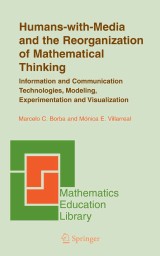Details

Humans-with-Media and the Reorganization of Mathematical Thinking
Information and Communication Technologies, Modeling, Visualization and ExperimentationMathematics Education Library, Band 39
|
53,49 € |
|
| Verlag: | Springer |
| Format: | |
| Veröffentl.: | 25.07.2005 |
| ISBN/EAN: | 9780387242644 |
| Sprache: | englisch |
| Anzahl Seiten: | 232 |
Dieses eBook enthält ein Wasserzeichen.
Beschreibungen
As we enter into the 21"Century, the presence of technology, particularly techno-science, in everyday life is overwhelming. Institutions in the modem world are affected by this presence. Like Janus, the ancient Roman god whose double-faced head signified his knowledge of the present and the future, education has always been a two-faced enterprise. The past establishes goals and methods of Education, and the other face tries to capture the future and suggests and proposes new directions of thought and new styles of behavior for the generation which, in a few years, will take over both routines and societal innovation. History tells us that this face of Education has always been sensitive to emerging technologies. Technologies of communication and information have been particularly influential in new directions of society, in particular of education. The transition from orality to writing marked a new role for the teacher. From the sole repository of accumulated knowledge, the teacher became a guide and interpreter of registered knowledge. The emergence of hardware, in the form of documents and books, initiated a companionship between teacher and hardware. It is also remarkable how the emergence of writing strengthened individual memory, contrary to the concerns of Thamus when Theuth explained to him the discovery of writing. The conservative king was afraid that the new invention would implant forgetfulness in the souls of men.
Why Another Book about Technology and Mathematics Education?.- Information Technology, Reorganization of Thinking and Humans-with-Media.- Modeling as a Pedagogical Approach: Resonance with New Media.- Experimental-with-Technology Approach: Resonance with Modeling and Multiple Representations.- Visualization, Mathematics Education and Computer Environments.- Modeling and Media in Action.- Experimentation, Visualization and Media in Action.- Mathematics and Mathematics Education On-Line.- Methodology: An Interface between Epistemology and Procedures.- Political Dimensions of Information and Communication Technology.
<P>This book offers a new conceptual framework for reflecting on the role of information and communication technology in mathematics education. Borba and Villarreal provide examples from research conducted at the level of basic and university-level education, developed by their research group based in Brazil, and discuss their findings in the light of the relevant literature. Arguing that different media reorganize mathematical thinking in different ways, they discuss how computers, writing and oral discourse transform education at an epistemological as well as a political level. Modeling and experimentation are seen as pedagogical approaches which are in harmony with changes brought about by the presence of information and communication technology in educational settings. Examples of research about on-line mathematics education courses, and Internet used in regular mathematics courses, are presented and discussed at a theoretical level. In this book, mathematical knowledge is seen as developed by collectives of humans-with-media. The authors propose that knowledge is never constructed solely by humans, but by collectives of humans and technologies of intelligence. Theoretical discussion developed in the book, together with new examples, shed new light on discussions regarding visualization, experimentation and multiple representations in mathematics education. Insightful examples from educational practice open up new paths for the reader.</P>
To our knowledge, there has been not book about computers in the last five years that approaches mathematics education issues from an epistemological level and that initiates a political discussion about the role of computers in mathematics education. Both discussions are based on research examples
Diese Produkte könnten Sie auch interessieren:

Kritische Analysen zur Perspektive weißer deutscher Frauen in der Kolonie Deutsch-Südwestafrika (1884-1915)

von: Ellen Brammer

48,99 €

Future Prospects of Technology Education

von: Marc J. de Vries, Stefan Fletcher, Stefan Kruse, Peter Labudde, Martin Lang, Ingelore Mammes, Charles Max, Dieter Münk, Bill Nicholl, Johannes Strobel, Mark Winterbottom

30,99 €

Schule im Kontext politischer Lernprozesse und kultureller Spezifik

von: Sarah Nell-Müller, Annika Scholz, Noémie Genet, Christophe Straub

39,99 €













